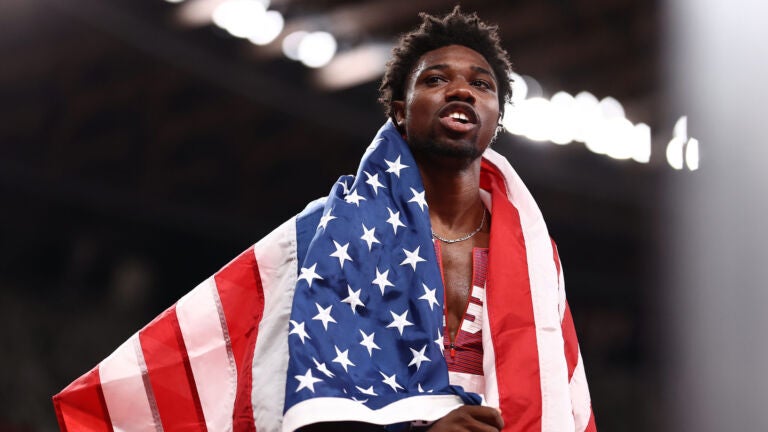Olympics
TOKYO — Noah Lyles, the American sprinting star, was less than an hour removed from racing to a bronze medal in the men’s 200 meters at the Tokyo Games on Wednesday when he opened up about his mental health and the challenges he had faced over the past year.
He spoke about dealing with depression. He spoke about seeking help in therapy. He spoke about the pressures of his profession. And he cried as he spoke about his younger brother, Josephus, whose own Olympic dream as a professional runner currently lives through Noah because he didn’t make the Olympic team.
“Sometimes I think to myself, this should be him,” Noah Lyles said through tears.
For Lyles and many others competing in Tokyo, the Olympics have doubled as a sort of catharsis. In fact, Lyles’ raw display of emotion was hardly unusual: Many athletes here have been outspoken about the burdens of performing in the wake of the most daunting 18 months of their lives, a period shadowed by the pandemic and racial strife — and a yearlong postponement of the Games themselves.
Simone Biles, the world’s greatest gymnast, withdrew from multiple competitions, citing the stress of the past year as one of the reasons she had lost the ability to control her body as she tumbled through the air.
Novak Djokovic, the top-ranked tennis player who had dominated his sport for months, cracked in his semifinal match, hurling his racket into the stands and smacking a replacement against a fence post. After that loss, and then after missing out on the bronze medal, he was as distraught as he had been in years.
Members of the U.S. women’s soccer team, a fairly indomitable force entering the Olympics, fell in the semifinals and spoke of losing the joy they usually feel when they step onto the field.
Lyles, 24, has been one of the most celebrated stars in U.S. track and field since he won a pair of gold medals at the 2019 world championships. But he has also routinely used his platform to share his struggles with anxiety and depression, and it was no different for him in the wake of winning his first Olympic medal.
“I knew there was a lot of people out there like me who’s scared to say something or to even start that journey,” he said. “I want you to know that it’s OK to not feel good, and you can go out and talk to somebody professionally, or even get on medication, because this is a serious issue and you don’t want to wake up one day and just think, you know, ‘I don’t want to be here anymore.’”
For a long time, he said, track was a sort of oasis. School was difficult for him when he was young, and running was an outlet. But over the course of the pandemic, some of that enjoyment disappeared. He took antidepressants on and off, and he was also profoundly affected by the police killings of unarmed Black people.
Before leaving for Tokyo, he broke down crying in front of his girlfriend, he said, “just talking about how hard it was to get through this year.”
Lyles had always told himself that he would leave the sport behind if he ever lost his passion for it, he said. But while he ultimately chose to continue to train and compete, he was determined not to let track control his life. In the process, he said, he sought more balance. He pointed to his interests in music, art and fashion.
“Even if this doesn’t go right in track, I still have a life outside of it,” he said. “I have places that I can go. I am not defined by being an Olympic bronze medalist, or a gold medal world champion, or the high schooler who went pro. That’s not who I am; I’m Noah Lyles.”
He was at his most emotional, though, when he addressed his relationship with Josephus, a sprinter who fell short of making the U.S. Olympic team this summer. When they were children, Noah Lyles said, it was actually his brother’s dream to compete at the Games.
“This wasn’t even my dream,” Lyles said as he sobbed. “I just wanted to tag along because I loved my brother, and I wanted to do this together. And it’s taken us so far, and I feel like he should be here.”
In the 200-meter final, staged in an empty stadium, Lyles finished behind Andre De Grasse of Canada and Kenny Bednarek, Lyles’ U.S. teammate. Lyles called his bronze medal “boring.”
“I didn’t win,” he said. “But at the same time, it’s a great achievement.”






